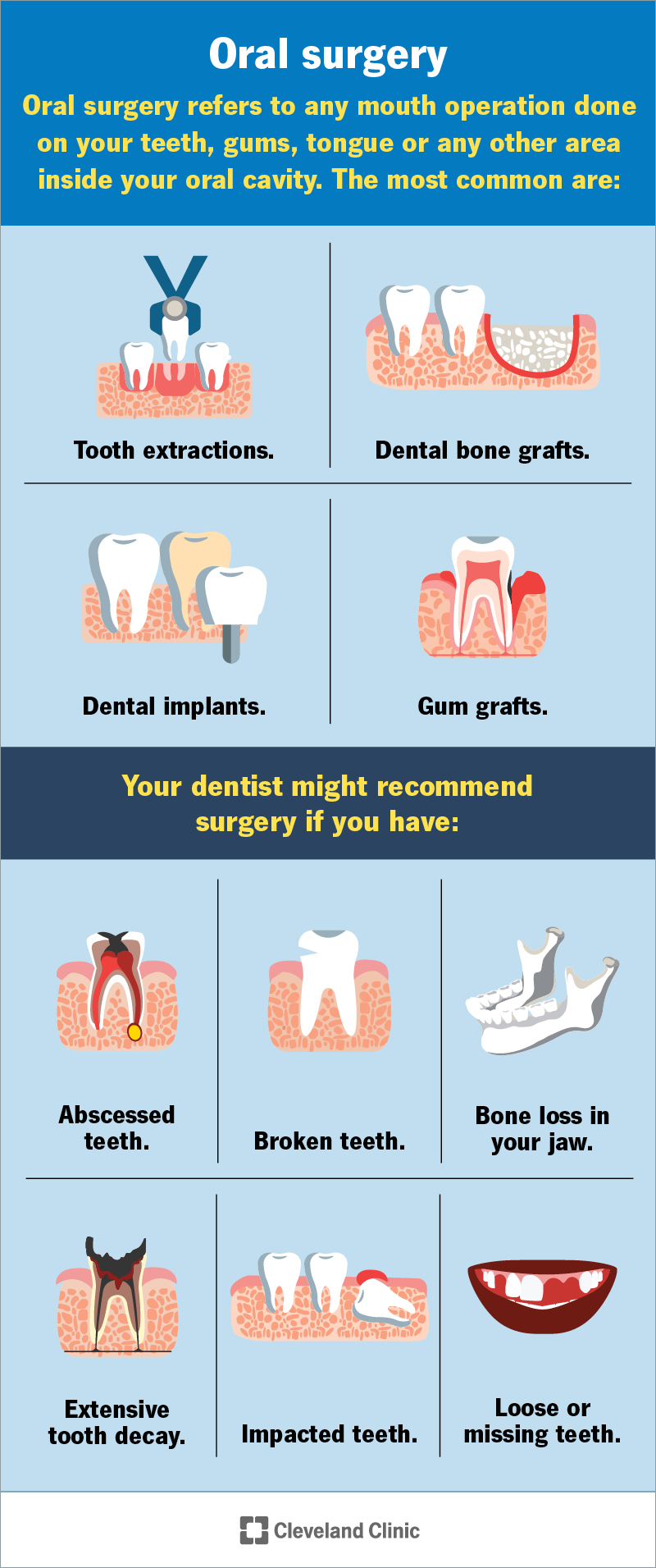Oral surgery refers to any operation done inside your mouth. Examples include tooth extractions, dental implants and tissue grafts. Dental specialists, who have advanced training in oral surgery, do these procedures. Healing times vary depending on the type of surgery you need.
Advertisement
Cleveland Clinic is a non-profit academic medical center. Advertising on our site helps support our mission. We do not endorse non-Cleveland Clinic products or services. Policy

Image content: This image is available to view online.
View image online (https://my.clevelandclinic.org/-/scassets/Images/org/health/articles/oral-surgery)
Oral surgery refers to any mouth operation. It includes procedures done on your teeth, gums, tongue or any other area inside your oral cavity.
Advertisement
Cleveland Clinic is a non-profit academic medical center. Advertising on our site helps support our mission. We do not endorse non-Cleveland Clinic products or services. Policy
There are several types of oral operations done each year. Some of the most common include:
There are many reasons why you might need surgery in your mouth. Your dentist might recommend it if you have:
Oral surgery and maxillofacial surgery overlap, but they’re not the same.
Oral surgery treats conditions that affect your teeth, gums and any other part of your mouth. Common procedures include tooth extractions, dental implants and gum grafting. Oral surgeons usually do treatments in a clinical setting (like an outpatient surgery center). Or they might do the procedure in a hospital if you need general anesthesia.
Maxillofacial surgery treats conditions that affect your face, mouth, jaws and neck. Common procedures include jaw surgery and cleft lip and palate repair. Maxillofacial surgeons can do many of the same procedures that oral surgeons do. But they also do cosmetic facial surgeries and reconstruct broken facial bones. Healthcare providers always do these procedures in a hospital setting.
Advertisement
It’s important to note that oral surgeons and maxillofacial surgeons have the same educational pathway and credentials. If you need your wisdom teeth removed, you’ll probably see an oral surgeon. But if you have facial injuries from a car accident, you’ll see a maxillofacial surgeon.
How you prepare for oral surgery depends on a few factors like what type of surgery you’re having and whether you choose sedation.
Your healthcare provider will give you pre-op instructions if necessary. But here are some things to consider, especially if you’re having sedation:
Depending on your situation, you might have your procedure at an outpatient surgical center or a hospital. What happens during oral surgery depends on the type you need. But here are some general things you can expect the day of your appointment:
How long your procedure takes depends on what type of oral surgery you need and how many teeth require treatment. A one-tooth extraction usually takes about 30 minutes, while a more involved procedure — like a gum graft — takes at least one to two hours.
Your healthcare provider will monitor you while the sedatives and/or anesthesia wear off. They’ll also give you post-op instructions explaining how to care for yourself and a list of soft foods to eat after oral surgery. Following these guidelines will reduce your risk of bleeding, infection and other complications.
Oral surgery can correct conditions that nonsurgical treatments can’t. Benefits include:
Advertisement
Like any procedure, oral surgery comes with risks. Possible complications include:
Healing times vary, but most people feel like themselves again in about two to three days. The more extensive your oral surgery, the more time it will take to recover. You shouldn’t have severe pain after oral surgery. But you’ll have some degree of discomfort. Your provider will give you medications to keep you comfortable.
After oral surgery, your mouth will continue to heal even after you feel better. Soft tissues usually heal in about one month. Bone could take up to six months to heal.
Taking good care of yourself after oral surgery can reduce your risk of complications. Here are some general recommendations:
Advertisement
After oral surgery, call your healthcare provider if you develop these signs of infection:
The thought of having surgery on your mouth might feel daunting. But it’s the only way to treat some oral conditions. Today, oral surgeons use minimally invasive techniques to make your recovery easier. Talk to your healthcare provider, especially if you have questions or are feeling anxious about your procedure. They can discuss sedation options to help you feel comfortable so you can get the care you need.
Advertisement

Sign up for our Health Essentials emails for expert guidance on nutrition, fitness, sleep, skin care and more.
Learn more about the Health Library and our editorial process.
Cleveland Clinic's health articles are based on evidence-backed information and review by medical professionals to ensure accuracy, reliability, and up-to-date clinical standards.
Cleveland Clinic's health articles are based on evidence-backed information and review by medical professionals to ensure accuracy, reliability, and up-to-date clinical standards.
Cleveland Clinic’s oral and maxillofacial surgery experts can help repair problems with your mouth, teeth and jaw with personalized treatment.
